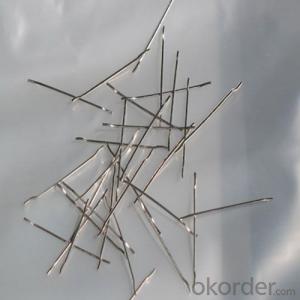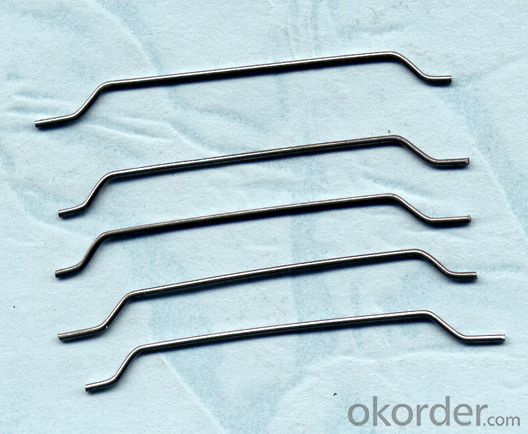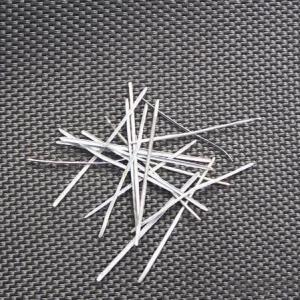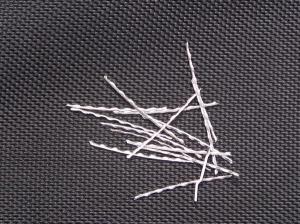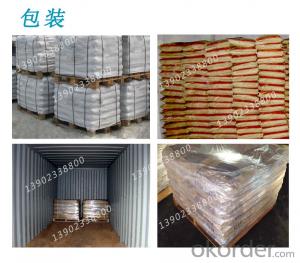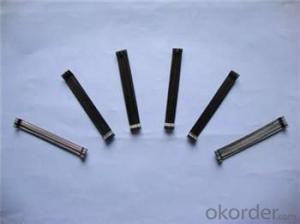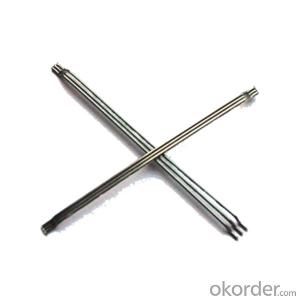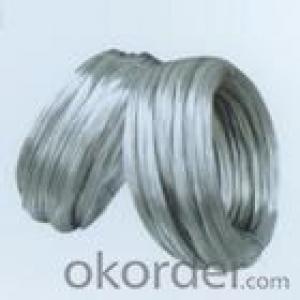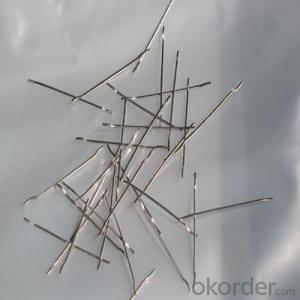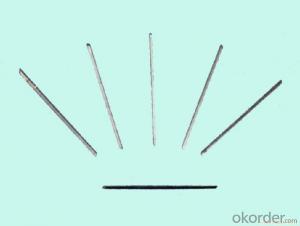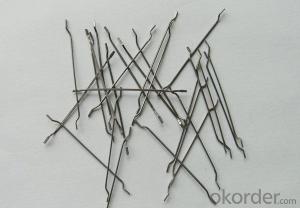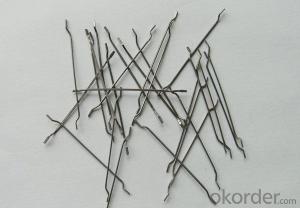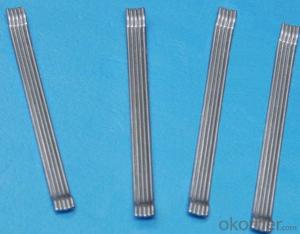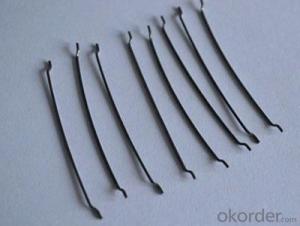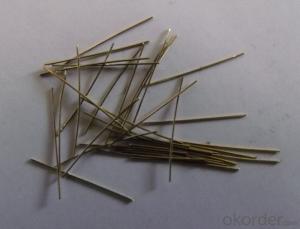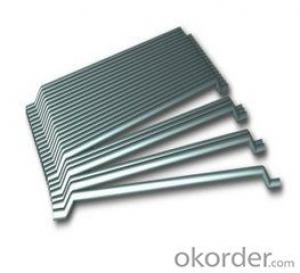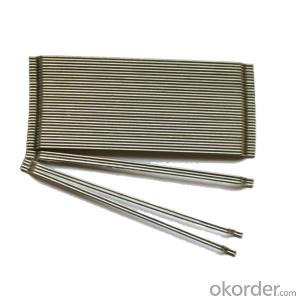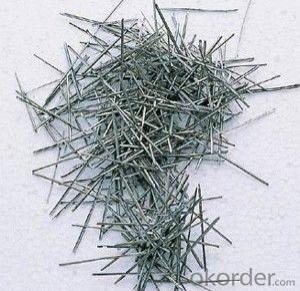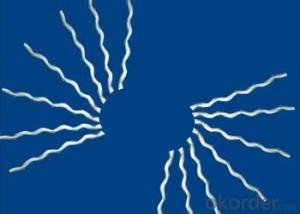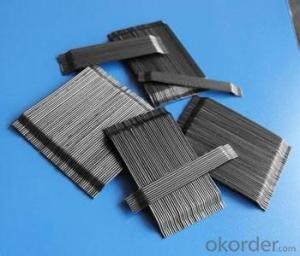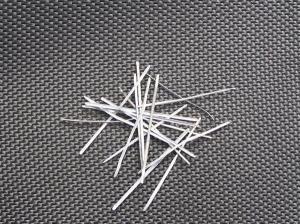Melt Extract Stainless Steel Fiber - Straight Type from CNBM China
- Loading Port:
- Tianjin
- Payment Terms:
- TT OR LC
- Min Order Qty:
- 1000 kg
- Supply Capability:
- 30000 kg/month
OKorder Service Pledge
OKorder Financial Service
You Might Also Like
Quick Details
Place of Origin: Shandong, China (Mainland)
Brand Name: CNBM
Model Number: LONGSTONE
Material: Stainless Steel
Specifications
Produces shear type, steel wire type, cut type, stainless type, and micro wire type steel fiber. It is used for concret.
SPECIFICATION
TYPE | SIZE | tensile strength |
ENDHOOKED STEEL FIBER | 0.5×0.5×30 mm | 850Mpa min |
0.6×0.7×35 mm | 850Mpa min | |
0.5×0.5×30 mm | 1000MPA min | |
0.6×35 mm | 1000MPA min | |
0.9×60 mm | 1000MPA min | |
CORRUGATED STEEL FIBER | 0.25×0.25×10 mm | 380Mpa min |
0.25×0.25×14 mm | 380Mpa min | |
0.5×0.7×32 mm | 380MPA min |
Picture
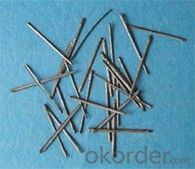
Steel fiber straight type
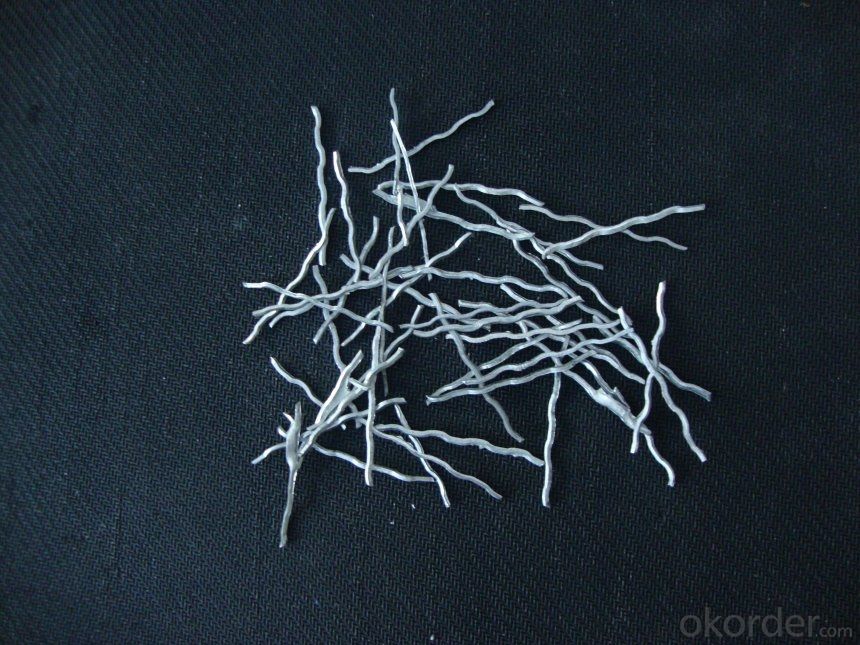
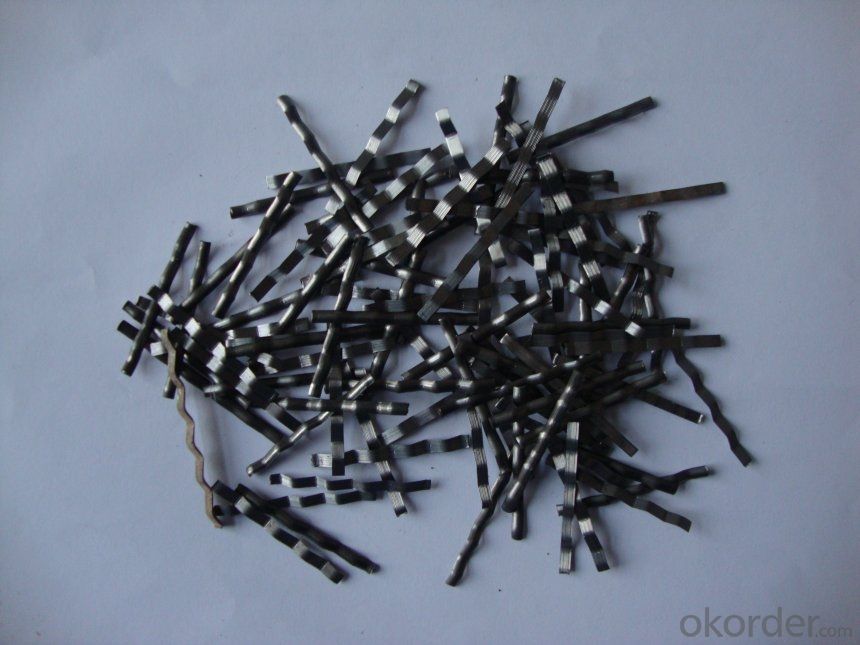
FAQ
certificated: ISO 9001
Technical advantages of Daye steel fiber:
A. Improve mechanical performance of concrete
B. Provide uniform distribution throughout concrete with excellent mixing
C. No balling or caking by adopt correct mixing method
D. Reduce concrete volume
E.Save construction time and cost
F.Reduce excavation volume
G.Available for jointless floor.
- Q: Can melt extract stainless steel fiber be used in high-rise building cladding?
- Yes, melt extract stainless steel fiber can be used in high-rise building cladding.
- Q: Can melt extract stainless steel fiber be used in lightweight shotcrete applications?
- Melt extract stainless steel fiber is a viable option for lightweight shotcrete applications. Adding stainless steel fibers to shotcrete mixes has proven to enhance the overall strength, durability, and crack resistance of the concrete. By incorporating stainless steel fibers, the flexural and tensile strength of the shotcrete can be significantly improved, which is particularly important for lightweight applications that require strong structural integrity. Moreover, stainless steel fibers also contribute to reducing shrinkage and thermal cracking, making them a suitable choice for lightweight shotcrete applications. However, it is crucial to carefully consider the specific requirements and specifications of the project and seek guidance from a structural engineer or shotcrete expert to ensure the appropriate fiber content and mix design for a successful application.
- Q: What are the main points of construction of steel fiber reinforced concrete?
- transportChoose a reasonable distance to set up the mixer to shorten the transportation time and distance of the steel fiber, preferably by pumping
- Q: Can melt extract stainless steel fiber be used in marine environments?
- Yes, melt extract stainless steel fiber can be used in marine environments. Stainless steel is known for its excellent corrosion resistance, making it suitable for various applications in marine environments. The melt extract stainless steel fibers are produced using a special process that ensures high tensile strength and durability, making them capable of withstanding the harsh conditions found in marine environments, such as saltwater exposure and high moisture levels. These fibers can be used in various marine applications, including reinforcement of concrete structures, marine coatings, and marine composites, to provide enhanced durability and corrosion resistance.
- Q: How does melt extract stainless steel fiber improve the resistance to seismic loading in shotcrete?
- Shotcrete's resistance to seismic loading can be enhanced by the inclusion of melt extract stainless steel fiber. This fiber improves the overall structural integrity and ductility of the material, resulting in a stronger and tougher concrete mixture. When added to shotcrete, stainless steel fibers act as reinforcement, providing extra strength and toughness. This reinforcement helps to distribute dynamic forces, such as those experienced during earthquakes, more evenly throughout the material. By doing so, the concentration of stress points is reduced, minimizing the risk of structural damage. In addition to strengthening the shotcrete, stainless steel fibers also improve its bond with the substrate. This enhanced adhesion and cohesion are crucial in seismic loading scenarios, as they ensure that the shotcrete remains firmly attached to the underlying structure. This strong bond allows the shotcrete to effectively resist the lateral forces induced by seismic events. The high tensile strength and corrosion resistance of melt extract stainless steel fibers make them an ideal choice for seismic-resistant shotcrete. These fibers can withstand significant tensile stresses and do not degrade over time, even in harsh environmental conditions. This durability ensures that the shotcrete maintains its structural integrity and seismic resistance over the long term. In conclusion, melt extract stainless steel fiber enhances the resistance to seismic loading in shotcrete by strengthening the material, improving its bond with the substrate, and providing long-lasting durability. By incorporating these fibers into shotcrete mixtures, engineers can confidently design structures that can withstand the dynamic forces associated with seismic events.
- Q: Can melt extract stainless steel fiber be used in lightweight or low-density concrete?
- Yes, melt extract stainless steel fiber can be used in lightweight or low-density concrete. The addition of stainless steel fibers to concrete offers several benefits. Firstly, it improves the overall strength and durability of the concrete, making it more resistant to cracking and shrinkage. The fibers also enhance the concrete's resistance to impact and abrasion, making it suitable for applications where the concrete may be subjected to heavy loads or wear. In lightweight or low-density concrete, the stainless steel fibers help to reinforce and stabilize the material. The fibers distribute the stress and load throughout the concrete, preventing the formation of cracks and improving its structural integrity. Additionally, the stainless steel fibers can help to control shrinkage and reduce the risk of cracking, which is especially important in low-density concrete where shrinkage can be more pronounced. Moreover, melt extract stainless steel fibers are corrosion-resistant, making them suitable for use in concrete exposed to harsh environmental conditions or in applications where the concrete is in contact with corrosive substances. This corrosion resistance ensures that the fibers will maintain their strength and performance over time. Overall, the addition of melt extract stainless steel fiber to lightweight or low-density concrete can enhance its mechanical properties, improve its durability, and provide better resistance to cracking and shrinkage.
- Q: What is the effect of melt extract stainless steel fiber on the shear strength of concrete beams?
- The impact of melt extract stainless steel fiber on the shear strength of concrete beams generally yields positive results. When incorporated into concrete, stainless steel fibers act as reinforcement by enhancing both tensile and flexural strength. This reinforcement mechanism effectively prevents crack propagation and enhances the concrete's ductility and toughness. Regarding shear strength, the inclusion of melt extract stainless steel fibers in concrete beams significantly boosts their resistance against shear forces. These fibers improve the cohesion between the concrete matrix and aggregates, resulting in enhanced interlocking and shear transfer mechanisms. Consequently, the concrete beams exhibit increased resistance to shear failure and overall structural integrity. Furthermore, the presence of stainless steel fibers minimizes the formation and propagation of microcracks caused by shear stresses in the concrete. By limiting crack formation, the fibers contribute to maintaining the continuity and stability of the concrete beams, thereby enhancing their shear strength. In addition, the aspect ratio (length to diameter ratio) of the stainless steel fibers plays a vital role in their impact on shear strength. Longer fibers with higher aspect ratios offer superior reinforcement and improve the shear strength of concrete beams compared to shorter fibers. It is crucial to carefully determine the optimal dosage and distribution of stainless steel fibers based on the specific requirements and design considerations of the concrete beams. Factors such as fiber length, diameter, volume fraction, and concrete mix proportions should be taken into account to achieve the desired improvement in shear strength while ensuring the overall performance and durability of the concrete structure.
- Q: Is melt extract stainless steel fiber suitable for use in high-performance mortar?
- Yes, melt extract stainless steel fiber is suitable for use in high-performance mortar. Stainless steel fibers are known for their exceptional strength, durability, and corrosion resistance, making them ideal for applications that require high-performance materials. When added to mortar, these fibers can enhance the overall performance of the mortar by improving its tensile and flexural strength, reducing cracking, increasing impact resistance, and enhancing durability. Additionally, melt extract stainless steel fibers have a high melting point, which allows them to withstand high temperatures without losing their mechanical properties. This makes them particularly suitable for high-performance applications where the mortar will be exposed to extreme conditions or thermal stresses. Overall, melt extract stainless steel fiber can significantly improve the performance and lifespan of high-performance mortar.
- Q: How does melt extract stainless steel fiber improve the resistance to fatigue in concrete?
- Melt extract stainless steel fiber improves the resistance to fatigue in concrete by enhancing the overall strength and durability of the material. The addition of stainless steel fibers helps to distribute and dissipate stress more effectively, reducing the formation and propagation of cracks. This reinforcement also increases the flexural strength and toughness of the concrete, making it more resistant to cyclic loading and potential fatigue failure.
- Q: How does the fiber length affect the performance of melt extract stainless steel fiber in concrete?
- The performance of melt extract stainless steel fibers in concrete is significantly influenced by the length of the fibers. In general, longer fiber lengths result in better mechanical properties and performance of the concrete. To begin with, longer fibers offer a larger surface area for bonding with the concrete matrix. This improved bond enhances the overall strength and load-bearing capacity of the concrete, making it more resistant to cracking and deformation. Moreover, the increased interfacial bond between the fibers and the concrete matrix improves the fiber's ability to distribute and transfer stresses, leading to enhanced durability and increased resistance to impact and fatigue. Additionally, longer fibers enhance the crack-bridging capability of the concrete. When cracks form, longer fibers are better able to span them and prevent their propagation. This crack-bridging ability helps maintain the integrity of the concrete structure and prevents the cracks from widening, thereby reducing the potential for further damage. Furthermore, longer fibers improve the post-crack behavior of the concrete. As cracks propagate, the longer fibers can redistribute the stresses and prevent localized failure, resulting in increased ductility. This ductility allows the concrete to undergo greater deformation before failure, enhancing its ability to withstand dynamic loads and sudden impacts. However, it is important to note that there is an optimum fiber length for achieving these desired performance characteristics. Very long fibers can lead to entanglement and clustering, which negatively affect the workability of the concrete mix and result in an uneven distribution of fibers. On the other hand, very short fibers may not provide sufficient reinforcement to the concrete and may not effectively bridge cracks. In conclusion, the fiber length of melt extract stainless steel fibers is crucial in determining their performance in concrete. Longer fiber lengths generally result in improved mechanical properties, enhanced crack-bridging ability, and increased post-crack behavior. However, finding the optimal fiber length is essential to achieve the desired properties without compromising other aspects of the concrete mix.
Send your message to us
Melt Extract Stainless Steel Fiber - Straight Type from CNBM China
- Loading Port:
- Tianjin
- Payment Terms:
- TT OR LC
- Min Order Qty:
- 1000 kg
- Supply Capability:
- 30000 kg/month
OKorder Service Pledge
OKorder Financial Service
Similar products
Hot products
Hot Searches
Related keywords
